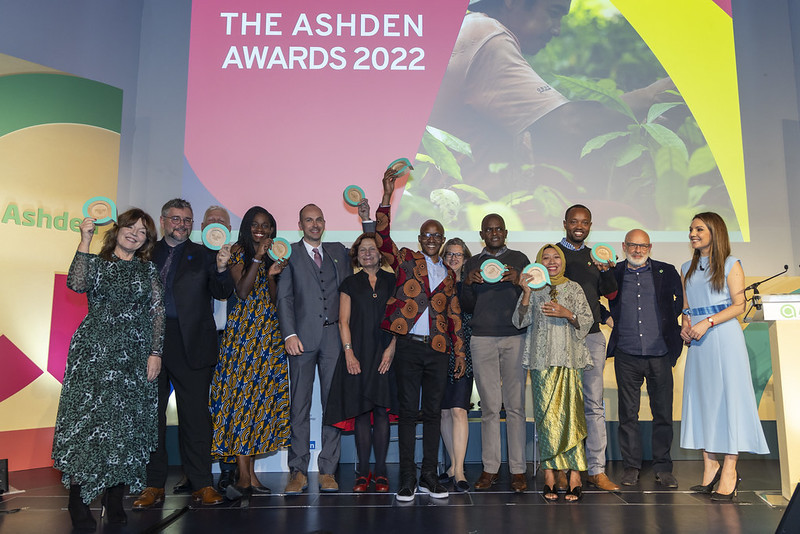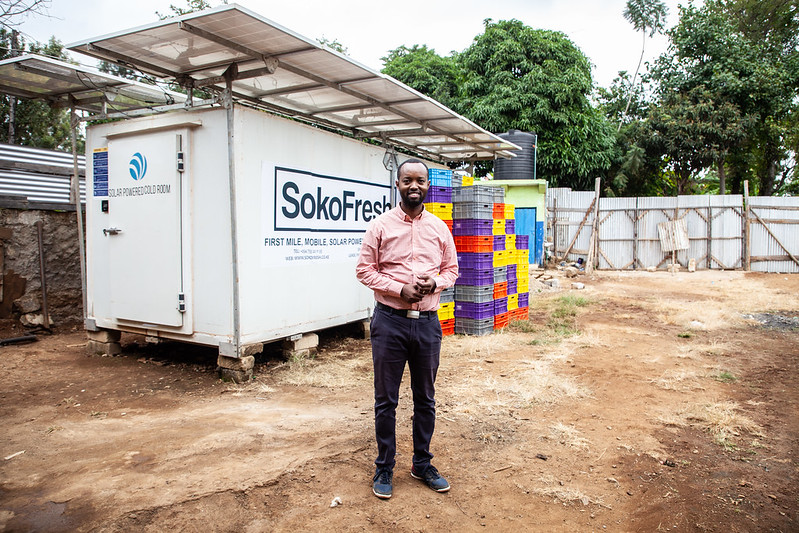
More than 600 million African people go without access to electricity, and more than 900 million are without safe cooking facilities.
At the COP27 climate summit now happening in Egypt, Power Up – a new campaign with over 45 member organisations, is amplifying marginalised African voices in pursuit of funding for green affordable energy, particularly for frontline organisations powering up communities most affected by energy poverty to build resilience and upscale adaptation efforts.
According to the IEA, bringing access to modern energy for all Africans calls for investment of US$ 25 billion per year, which is around 1% of global energy investment today.
Using the hashtag #GreenPowerisaMust, the Power Up campaign is coordinated by Ashden, a charity working with organisations in the global South and the UK on climate solutions. Power Up’s members are now calling on iNGOs, businesses, civil society organisations, faith groups and other organisations across society to back the campaign.
Globally, green energy could create 14 million jobs by 2030, the campaign points out. And studies from Kenya and Nigeria suggest that every green energy job created in rural areas could lead to five more jobs through increased economic activity.

Photo: #GreenPowerisaMust – SokoFresh CEO Denis Karema stands outside a mobile, solar-powered cold room which helps smallholder farmers in Kenya get a better, more reliable income for what they grow, and massively reduces waste, energy costs and carbon emissions. The Power Up coalition is calling for action and investment in energy access from leaders attending #COP27. Credit: Kelvin Juma/Ashden
Dr Sheila Oparaocha, Director of coalition member the ENERGIA Network, said: “At COP27, taking place in Africa, world leaders can deliver climate justice and change the course of history with action to invest in affordable sustainable energy.
“More finance must flow from nations responsible for the climate crisis to those in greatest danger – and money already promised must be delivered. Crucially, using adaptation funding to widen access to sustainable and affordable energy will ensure African communities are better prepared for the challenges ahead.”
Harriet Lamb, CEO at Ashden, said: “Energy access and government climate finance must be put at the heart of these crucial climate negotiations. Nations in the global South need finance to support clean and accessible renewable energy.
“In addition, everything must be done to unlock private sector investment. Countries in the global South did nothing to cause the climate emergency yet are already suffering most from its impacts and stare into an uncertain future. Governments in the global North which carry the biggest legacy of fossil fuel burning have an obligation to support the South. Globally, we all rely on each other, for food and resources, and so no-one can be left behind.”
Powering up access to water and food
More than 40% of food perishes before it reaches the consumer – solar-powered water pumping and cold storage can strengthen African agriculture in the face of climate crisis, like Simusolar which deliver clean-energy powered equipment to off-grid communities in Tanzania and Sokofresh which bring solar-powered cold rooms to the country’s smallholder farmers in Kenya (see photo). Solar water pumps can make Africa’s agricultural land more resilient and productive – currently, just 7% is irrigated – while establishing cold chains equivalent to wealthy nations would raise countries’ food supplies by 15%.
Powering healthcare
Climate change will create and increase health risks across Africa – but 60% of African health facilities go without electricity. Scientists have predicted that if emissions continue to increase, heat-related deaths of children under five in Africa could double by 2050.
With an increase in renewable power, health services will be able to respond more effectively to health challenges. Currently, 60% of Africa’s clinics lack access to electricity and often lack digital connectivity for hospital administration, information and the education of medical students. By using solar power, initiatives such as Solar Freeze in Kenya can provide cold storage for medicines and vaccines in clinics, replacing expensive and polluting diesel generators and providing access in remote communities.

Photo: Solar Freeze in Kenya provide pay-as-you-store solar-powered refrigeration to medical institutions and businesses in humanitarian settings. Credit: www.solarfreeze.co.ke/
Boosting economic growth and jobs
Renewable energy also boosts incomes and economic growth. Locally generated renewable energy brings these benefits cheaper, faster, and reaches more people than new fossil fuel infrastructure. Initiatives such as Zonful Energy in Zimbabwe and Energy Generation in Togo are training young people and women in solar energy installation and business skills.

Photo: Nadine Couao Zotti stands with her sheet press prototype that produces paving blocks from plastic waste. Nadine has undergone a 2-year entrepreneurship in residency training and has returned for solar technology training at Energy Generation in Lome, Togo. Credit: Ashden Awards/Francis Kokoroko
Africa’s trailblazers call for change
The growing list of frontline organisations backing Power Up includes four 2022 Ashden Award winners which were awarded for their trailblazing work at the recent Ashden Awards in Nairobi and London, showing energy access in action:
- Kakuma Ventures, Kenya – bringing solar powered Wi-Fi to one of the world’s largest refugee camps, supporting skills and entrepreneurship.
- SokoFresh, Kenya – providing sustainable cold storage for smallholders, matched with help getting products to market.
- Energy Generation, Togo – a ground-breaking training centre empowering entrepreneurs to create solutions for Africans by Africans – sparking opportunities for women.
- Zonful Energy, Zimbabwe – providing training in the solar sector for rural young people, through collaboration with colleges and NGOs, alongside connections to jobs.
Other innovative energy access organisations in the Power Up campaign include:
- Smiling Through Light, Sierra Leone – providing affordable solar lighting to families in Sierra Leone, using a woman-to-woman sales model.
- Ignite Power, Rwanda – delivering solar-powered irrigation to Rwanda’s farmers.
- Zonke Energy, South Africa – bringing clean energy to off-grid township communities in South Africa, with mini-grids designed for urban settings.
Innocent Tshilombo, Co-founder and Managing Director at Kamuma Ventures, an organisation creating clean energy, internet connections and new jobs for residents in Kakuma refugee camp in Kenya, said: “I know the power of green, affordable energy to change lives. But organisations like mine need much more support to scale up our work.
“We’re playing our part, in communities where the need is greatest – now politicians and global funders must step up. The more people back Power Up, the louder the call for action.”
The campaign will initially focus on five African countries with the potential to be trailblazers in growing energy access – Kenya, Rwanda, Sierra Leone, South Africa and Tanzania. But in 2023 the campaign is set to expand its focus to countries around the world affected by energy poverty.
See a full list of Power Up coalition members, and how to back the campaign at the Power Up website.
Photo: All the 2022 Ashden Awards winners at the end of the ceremony. The 2022 Ashden Award winners’ ceremony was held at the Royal Geographical Society, London on 2 November 2022 (photo by Andy Aitchison/Ashden).
